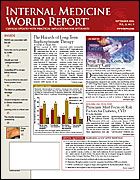Publication
Article
Anemia a Major Cause of Hospitalization, Death in the
Author(s):
Journal of Gerontology: Medical Sciences
Older adults who develop anemia are significantly more likely to be hospitalized and are nearly twice as likely to die as their nonanemic peers, according to a new study published in the (2006; 61:474-479).
Investigators looked at 3607 adults aged ≥71 years from the National Institute of Aging?sponsored Established Populations for Epidemiologic Studies of the Elderly. The 451 participants (12.5%) who were anemic were more likely to be older, black, and have a low body mass index.
During 4 years of follow-up, 37% of those with anemia died, compared with 22% of those without anemia. Also, 66% of those with anemia were hospitalized at some point during the study compared with only about 50% of those without anemia.
IMWR
"Those older patients having mild anemia have not been considered at higher risk, but our data show that even those patients with low or close to normal range do have a higher risk for death and hospitalization, and they should be considered for more in-depth screening for other conditions," investigator Marco Pahor, MD, chairman, Department of Aging and Geriatric Research, University of Florida, Gainesville told .
"The most important message is that elderly patients with even mild anemia, even just slightly above the norm, have a higher risk?independent of any other risk factors. Primary care physicians need to pay more attention to even minor cases of anemia and then work more aggressively to find the causes of the anemia," he said.
Another important finding of this study was that patients with anemia had longer hospital stays (25 days vs 13.7 days for nonanemic patients).
The World Health Organization defines anemia as an oxygen-ferrying molecule hemoglobin concentration <12 g/dL in women and <13 g/dL in men. About 13% of people aged ≥70 years have anemia, and prevalence increases with age, Dr Pahor noted.
Paulo Henrique Chaves, MD, PhD, of Johns Hopkins University's Center on Aging and Health, Baltimore, said this study should be a wake-up call for primary care physicians, as it provides insight into anemia as a strong prognostic factor for major health complications.
"What remains to be established now is whether pharmacologic corrections of mild anemia in older adults may help slow the disablement process, preventing the onset and progression of frailty and disability?and prolonging survival," said Dr Chaves.
The first step toward correcting anemia is identifying and treating the underlying cause, whenever possible. Treatment may involve supplemental iron in patients with low serum iron, vitamin supplements to replace folate and vitamin B12 in those with poor eating habits, erythropoietin to enhance red blood cell production in those with kidney problems, and antibiotics in those with infections, according to Dr Pahor.
Key points
Evidence shows that anemia increases the risk for and length of hospitalization, as well as death.
Physicians should aggressively investigate and treat the underlying cause of anemia.






